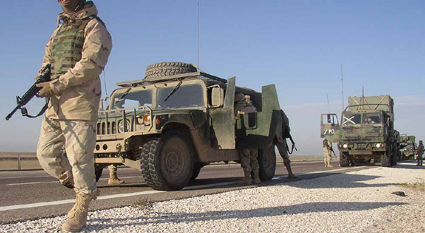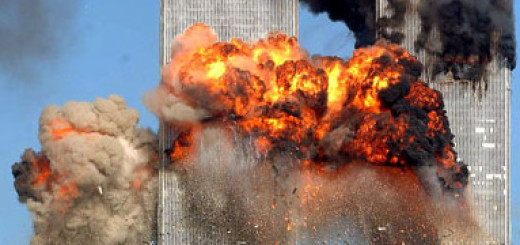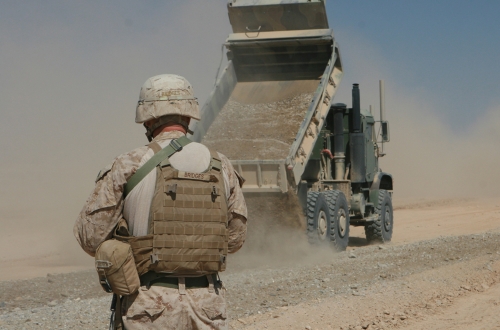The unbearable cost of discount war.
I don’t personally know anyone who has been directly impacted by our wars in Iraq and Afghanistan. If you told me that such and such acquaintance whom I don’t regularly see has a son or a grandson or a nephew serving, I’d believe you. But since the invasion of Iraq in March 2003, I have not held one conversation with a close friend or family member about the danger his or her son or daughter is facing or has faced in either war. The wars in Iraq and Afghanistan have not touched me personally.
Such was not the common experience in World War II. Between 1941 and 1945, sixteen million Americans, mostly men, put on a uniform. Of those, 310,000 never came home and another 600,000 were injured. No part of America was untouched. Not a family, not a church, not a school or a neighborhood. Virtually every American had a family member or a close friend in the uniform. Virtually every American knew someone that died.
The human cost of World War II didn’t stop with military casualties. Countless hundreds of thousand of civilians in Europe and Japan were killed as a direct result of American bombing or invasion.
World War II was a complete victory that was purchased at a staggering price. But complete it was and thus the price that was paid is seen today by clear thinkers as the regrettable but necessary price of peace. America’s sacrifice left Germany and Japan utterly devastated and completely incapable of fighting. That complete victory cleared the way for them each to be rebuilt as the responsible, productive and peaceful world citizens that they are today.
World War II was a full price war. But the paying of that price left emotional scars and as a result, America has since engaged in the ongoing delusion that wars can be fought in a contained and limited way. Call it “discount war.” That delusion is proving costly.
We pulled our punch in the Korean War and thus fought to a draw. After 137,000 American casualties including 36,000 dead and nearly six subsequent decades of defending a fragile peace, North Korea continues as a regional menace while her people live in abject hopelessness.
In Vietnam Lyndon Johnson kept America engaged in a war that he would neither finish nor quit. More than 58,000 American boys died toward no purpose and America left Vietnam in defeat.
Bush 41’s Gulf War of 1991 was incomplete. We succeeded in getting Saddam Hussein out of Kuwait but we left him in place to cause further trouble. Bush 43 got Hussein out of the way but left his supporters, sympathizers and regional troublemakers capable of mischief that we can be sure they will cause in the days ahead
After spending the majority of the 21st century engaged in Afghanistan and Iraq, we find ourselves in what amounts to a rolling stalemate that is both chronic and intolerable.
Thus, as I watched President Obama’s speech Tuesday night, I reached the late conclusion that we should never have gone in to Iraq and Afghanistan. We went in to both wars for the right reasons. But the price of clear, overwhelming and decisive victory appears to be greater than the majority of Americans are currently willing to pay. Bush tried without success to keep America rallied. Obama is not even trying.
As a result of that unwillingness, the day will come that something so terrible, so unimaginably barbaric and so heinous happens that Americans will again find the will to pay full price for a war. And a full price it will be.
Until then we should keep this in mind. Discount wars like discount versions of name-brand goods often wind up absorbing the purported savings many times over in the much higher cost of their ultimate unsuitability and failure.
We therefore need to avoid discount wars. We can’t afford them.









First of all, the goal of installing pluralistic democracy in a Moslem nation is laughable and illusory: It can flourish so long as we maintain a military presence there, and then everyone who voted or otherwise cooperated with the U.S. will be killed when we leave. Such an absurd and illusory agenda makes the loss of even one American life too high a price to pay.
However, a “contained” or “limited” war (your terms) could very well have succeeded, if Bush Jr. had sent air strikes to decimate every terrorist training camp in the mideast and Africa, and killed every man, woman, child, goat and cockroach residing there. It would have been unmistakable in its message, and could very well have been executed at little or no cost in American lives. As a deterrent, it would have been excellent. If not, then repeat the formula with Mecca and other mosques on Ramadan…
If W hadn’t lied about WMD’s we never would have been there.
You are so right on the money. America has not fought “to win” in so long that it has forgotten what it takes. We bleed “just a little” to make war more acceptable to the masses. But, we bleed. Men and women are killed, wounded, maimed and lives destroyed or changed forever. But, its “just a little” so there is no outcry.
As a Viet Nam vet, I remember the days of not being able to quit and not having the backing to win. Rules of engagement, “advisors” running the war for the President who had no idea what was going on and a public that grew very tired of it all.
We never lost a battle, but we lost the war…Why? Because no one (but us Marines and Soldiers) were committed to doing what it took to win quickly. I see both Iraq and Afghanistan as the new Viet Nams….either win the darned war or bring our troops home. This old war horse has seen enough of the alternative and bleeding “just a little” is not acceptable any longer.
Rick Armstrong
Tyler, Texas
The United States was a force to be reckoned with during the Wars I and II. Thanks to Johnson and Vietnam, our standing in the world started to slip and has continued to with each “unfinished war”. Guess you could call me a “Hawk” because I believe in a stong military and using it. NO war is wanted, but to remain FREE sometimes war is called for. We can not go in with any attitude other than WINNING. To do this, we can not go in shackled by political correctness as it has no place in a war. I feel it has no place anywhere, but then that is just my opinion. But in a WAR, you do what it takes to win. Doing any less opens the door for future problems.
Obama has no intentions of winning, his reasoning is something no one is willing to face the facts on, so I will not go there. He has already opened the door to a muslim take over of our Country with his coddling of terrorists and demanding we give miranda rights to the ones trying to KILL US. When fighting a war, we need to do it General Patton’s way!
In the Old Testament, Jehovah knew how to vanquish the enemy: take no prisoners or booty and scorch the land.
When attacked by terrorists the American response should be total destruction of every terrorist camp in every country that tolerates these camps. After our dropping of the first nuclear weapon on the first camp, the nations that tolerate and encourage this nonsense will take action themselves to eliminate them, or wish they had.
There is no virtue in negotiating with terrorists and nations that give them safe haven. Lack of their destruction simply encourages their proliferation. Are we going to follow this logic when the next attack occurs on our country? It is just a matter of time, since they don’t fear us yet and the conflict has not been resolved with our VICTORY!
Every American generation should expect to defend its Liberty and Freedom. Evil men, both domestic and foreign, will never cease to try to destroy us. We are a threat to their tyranny, whether political or religious.
Even a fanatical Islamic suicide bomber is not willing to see his entire family and village destroyed. If I’m wrong, then let the destruction begin. The cost of toleration of this kind of Evil must become unbearable to the enemy, not us.
While your dissatisafaction w/ Obama is justified you should reserve your harshest protests for Geo. Bush and Co., who got us into Iraq under falsehoods.
It’s hard for Christian people to wage all out war. There must be a clearly defined and “evil” enemy. In WWI and prior, the news media gave sanitized coverage of the war and it was easier to wage total war without the film coverage.
Film coverage began in WWII and it was still highly sanitized, but traumatizing. One wonders what Americans would have done had they been able to see the film of the real atrocities. Eisenhower made his historians and embedded reporters photograph everything as did MacArthur. It helped us come to terms with WWII and the havoc we wreaked to see the evil we had ended up close. Who can forget the heaps of naked, dead Jews and emaciated POW’s and the acres of murdered Chinese. When we understood the enemy, we supported the total effort we had to make to defeat them.
Like the Jews, however, we shrink from waging war Jehovah style and it comes back to haunt us. Sadly, with war, it’s all or nothing. Limited war is too expensive, too invisible to the people who pay the bills and too far away from their own concerns for people to care very much.
We also have the problem that the media views war through its own peculiar prism, forged by decades of leftist university journalism professors. If one were to tell the stories of what we put an end to in Iraq and Afghanistan alone, the American public would have little trouble supporting an effort to end that war.
But for every journalist who tells the story of villagers gassed with a most hideous chemical WMD, villagers lined up and machine-gunned, then bull-dozed into a ditch or fathers and mothers and even children tortured brutally in the prisons of Abu Graib, there are ten who tell stories of Americans committing atrocities, soldiers dying pointlessly (according to the commentator) or corrupt leaders profiteering off the war.
Oddly, for some reason Americans would prefer to believe we are being bullies and thugs than they are to believe that such horror could be going on somewhere. We can bring our boys home and stop fighting wars and then we would be guiltless – that’s easy so long as we disbelieve the “jingoist” reports of what sort of truly evil stuff is going on in those nations.
For if we believe those things are going on, our Christian upbringing tells us we must do something to stop it. But that would be hard and risky and no one is hurting our families here in the states. We don’t want to know what’s going on beyond the walls. It’s too painful to look at, so we tune in the media that tells us the local gossip and focuses on our own problems.
We can’t help the soldier children in Africa or the tribes being starved and tortured in the Middle-East. We just don’t want to know about it so we can sleep at night in our fluffy beds.
9/11 shook us up. That’s why we went to Afghanistan and Iraq. They hit us at home. They killed American mothers, fathers, grandparents and children. Osama bin Laden is a very poor strategic tactician. If he’d just kept hitting us outside of our own borders, he could have systematically discouraged us and induced us to abandon our friends and allies in the world.
If he’d not made that colossal mistake, he’d be far closer to the Caliphate the Muslim fanatics dream of and the American people would never have allowed us to go to war to stop him. If he can just restrain himself from attacking us again, he still has a chance at victory. The mainstream media certainly won’t cover that war as closely and Americans will ignore it until one day we look up and discover an angry, armed and hostile Middle Eastern superpower that has been made proud of their “technological contributions” to civilization by our NASA goodwill outreach program and they will be pointing some very nasty “technological contributions” right at us. Only, unlike the Cold War, there will be truly insane madmen with their fingers on those triggers.
Tom King
Tyler, Texas
It pains me to partially disagree with Mr. Gleiser on his recent conclusion that the Iraq and Afghanistan wars were a mistake (in his opinion) because of our “discount war” tactics and because of the apparent lack of support of the American people to fight these wars. While I wholeheartedly agree that “discount wars” produce a long frustration in the American people that usually causes us to end a war before it is finished, I doubt that we would now be better off had we not gone to war with Iraq and Afghanistan. Isn’t it probable that the terrorist forces would be even stronger, now, with even more carnage on their hands? How should the families of our dead or maimed soldiers feel if we say that we shouldn’t have gone to war after their sacrifice? Paul, you are usually correct in your analysis of most subjects on this web page, but, this one is worthy of reconsideration.
I can’t imagine anything more barbaric and heinous than the events of 9/11/2001. Can anything be more horrible than what the victims of 9/11 experienced as they began to understand how they were being murdered? The family and friends of the murdered will never get over the horror of this despicable act of war by these Islamic fanatics who are following their demented religious beliefs. These terrorists and the state sponsors of terrorism are using the cloak of an Islamic theocracy in which religious/political dictatorships are making war on the free world, all in the name of Allah. Have we seen any significant Muslim outcry around the world to condemn these terrorist acts of war?
The fact is that the “hate America first” crowd that is the CREED of the political left and the mainstream media in this country will NEVER consider ANY act of horror worthy of our retaliation by bringing decisive warfare to the enemy. It has been their mission to discredit every attempt to vanquish the followers of radical Islam and terminate the terror that continues to spread around the world in the name of religion. Just because the media has created this straw man of American opposition to our wars in Iraq and Afghanistan does not make it true.
The frustration of the war on terror will only continue as long as appeasement to fight the war via “political correctness” continues to abound. A limited war using surgical strikes will never run out of terrorists willing to obey Allah by committing suicide. Terrorists don’t wear uniforms or operate as enemy nation states as in our previous wars. We must make the war on terrorists so costly that their own people will destroy them out of simple self preservation.
The problem is not that we chose to fight the war but that we are being misled by the despicable media and 5th column politicians into a state of self-disillusioned compromise to fight a “discount war” because they know that it will never succeed. This is how they will ultimately weaken and defeat America and establish their own form of tyranny – Socialism/Marxism/Communism, which they justify, so long as they are in control.
The ruling class (professional politicians) in this country follows “political correctness” in order to squash opposition that comes from the patriotic American citizenry that is the heart and soul of this great nation. The wars in Iraq and Afghanistan were and are being fought by our American volunteer military without a draft. This is a magnificent testimony of our willingness to defend our unalienable rights and punish the aggressors. I believe most Americans in their hearts are not in favor of the “discount, politically correct war” but have been temporarily seduced by the unending lies of the media to accept the status quo of limited success.
The problem is not our decision to go to war but in the weak leadership that has succumbed to the constant propaganda of the left. What person in a leadership position in this country has had the fortitude to cry out for total annihilation of the terrorists and those who give them comfort and support? What we lack is leadership that is as dedicated as our wonderful American soldiers that put themselves in harm’s way. This should be our complaint, not that we went to war. Otherwise the enemy and our allies will always confuse weak leadership that is subject to change every two years with the long term resolve of the American people, at large. To say that we shouldn’t have gone to war because we are now plagued with the worst President (Obama) in our history doesn’t address the fact that the American people are in charge and will make necessary corrections to do the right thing. We must continue to expose and defeat the evil propaganda and appeasement of the left regardless of who is President if we are to save this great nation from continued terrorism.
Isn’t it possible that President Obama believes that peaceful coexistence is a better long term strategy to win over the Muslim nations to accept American as a friend while we set an example of benevolence and tolerance towards all the poor nations of the world. By waging these “discount wars” to use your words, we are actually enforcing the hatred for the USA that some Muslims are trying spread. Since these “discount wars” are creating a rolling stalemate, then Obama is correct in trying to end them and you are to be congratulated for recognizing this. If we were to spend half of the amount we spend on these foreign wars in helping the disadvantaged nations of the world to climb out of poverty, America would be far better off and we would have a safer world.
When I heard this segment last week I could not have been any more emphatic in my agreement. The maddest I got at GW Bush was when he did not fire Rumsfield after his re-election. Someone had to go I felt after the way the war was handled.
We stormed through Iraq swiftly and thoroughly trounced them. Then it seems when we hit the city limits of Baghdad the playbook was turned over to the custodial staff at the Pentagon. They waisted the support they had at the moment of citizens & press. Instead of crushing the larynx with the boot heels of our marines we opt for the rubber bullets and open borders for the “bad people” of Iraq to flee in terror.
GW Bush opts for the “old man, son & donkey” approach that Aesop spoke of. Calling off the dogs of war and assumning a 2nd motive of presenting democracy to a nation of sand & historical totalitarianism. History has shown clearly that no occupying force has ever left Afghanistan in any fashion except retreat. I much more favored stomping into the earth any being that even seemed to be hostile and leaving them to their scorched earth.
It has sickened me to watch the political manuevering in this country. I totally supported going into Iraq and not finding WMD’s never concerned me. Frankly I have not been “sickened” by civilian loss of life in either conflict, being much more concerned with the horrible position our troops have been in.
I have believed since 2004 that another event like 9/11 will be nessicary for our lady America to truly have the will. My best friend last Saturday enraged me momentarily when he was popping off ignorantly. stating how wrong it was for us to drop the bombs in Japan. How the USA is the only country to ever use nukes. I quickly retreated from the conversation realising my friend has bought into the ignorance of the left.
But not before he stated how it was no big deal having a mosque built @ ground zero. his son is attending NYU and I could not help but wonder how his view would be if his son was one of those murdered ?
Have you forgotten, how it felt that day?
To see your homeland under fire
And her people blown away
Have you forgotten, when those towers fell
We had neighbors still inside goin through a livin hell?
God bless this great country and God’s speed to our troops returning home if America is a resolved to this course.
I have not forgotten !